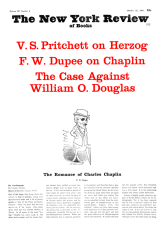In response to:
How Much Can Man Change? from the September 10, 1964 issue
To the Editors:
I agree with the spirit of Bruno Bettelheim’s review of Stability and Change in Human Characteristics. I would only make a plea for a broad and flexible definition of how the child’s early years, and what in those years, makes for the later determination of his life in school or the world.
I am thinking of many children I’ve studied under desegregation in the South, children from poor homes, broken homes, illiterate homes; homes filled with violence, alcoholism, psychosis; in sum, the lot of it all. In enough cases to trouble me deeply, steeped and trained as I am in the modern psychiatric view of childhood and its powerful momentum, these children responded to incredible stress without developing the symptoms I went expecting to find. My ignorance, naiveté, and the insularity—even the smugness—of my own background prevented me from appreciating hidden sources of strength which, as they came to grips with an enabling historical moment become for these children a personal one, resulted in surprising demonstrations of personal steadfastness and academic accomplishment. Their teachers were surprised, their guidance counselors, too; and I have perhaps allowed my own surprise to deteriorate into hesitancy and caution in talking about just what does make for importance in those important early years. The thirteen factors listed by Professor Bloom as having crucial influence on the growth of intelligence would, as applied to many of those children, doom them on almost every count, including in several cases the one we easily accept about Negroes, that their mothers are warm and loving with them while they are infants.
I don’t know, and I don’t intend for my uncertainty to recommend itself in the form of perverse anti-intellectualism on the matter; but I feel that human beings are indeed capable of change and growth at any age, depending on what in them engages with what is their world. At any moment in our lives we are a lot of things unknown and irrelevant because of what is happening at that moment. The great virtue of Erikson’s view—mentioned by Bettelheim—is that he sees this, and he tries not to allow his ideas about childhood to slip into a confining determinism. Yet the very nature of time, our lives lived in it, and our minds as they come to grips with both and try to make sense of their relationship lead us to some kind of determinism.
Bettelheim is right in urging a shift of concern from the various dogmas of educational psychology to a study of infancy and childhood and what the child learns then that seems so crucial in deciding what—if anything—he’ll more formally learn later. His own work has taught us to recognize the ambiguity of human existence, and often at a time when others have been tenacious and even petulant in their sense of man’s fixed destiny. I write simply to emphasize that the “reform” he suggests in the life of children will require a good deal of further spelling out. And I think I am cross with a significant trend in our culture which insists that the spelling out be so heavily founded on the life of the mind and the home that history, society, and politics are either totally ignored in their influence on our growth and development or given a slim and careless notice outrageous for its narrow-mindedness.
Robert Coles
Concord, Massachusetts
This Issue
October 22, 1964



